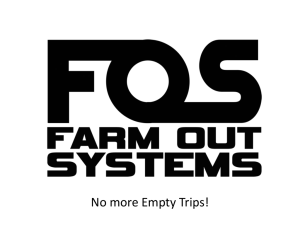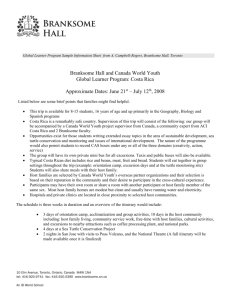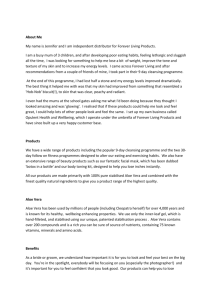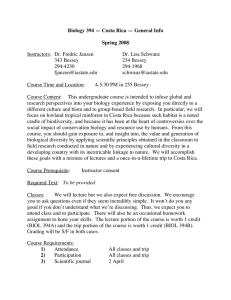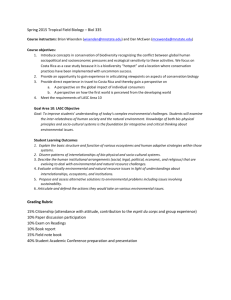O
advertisement
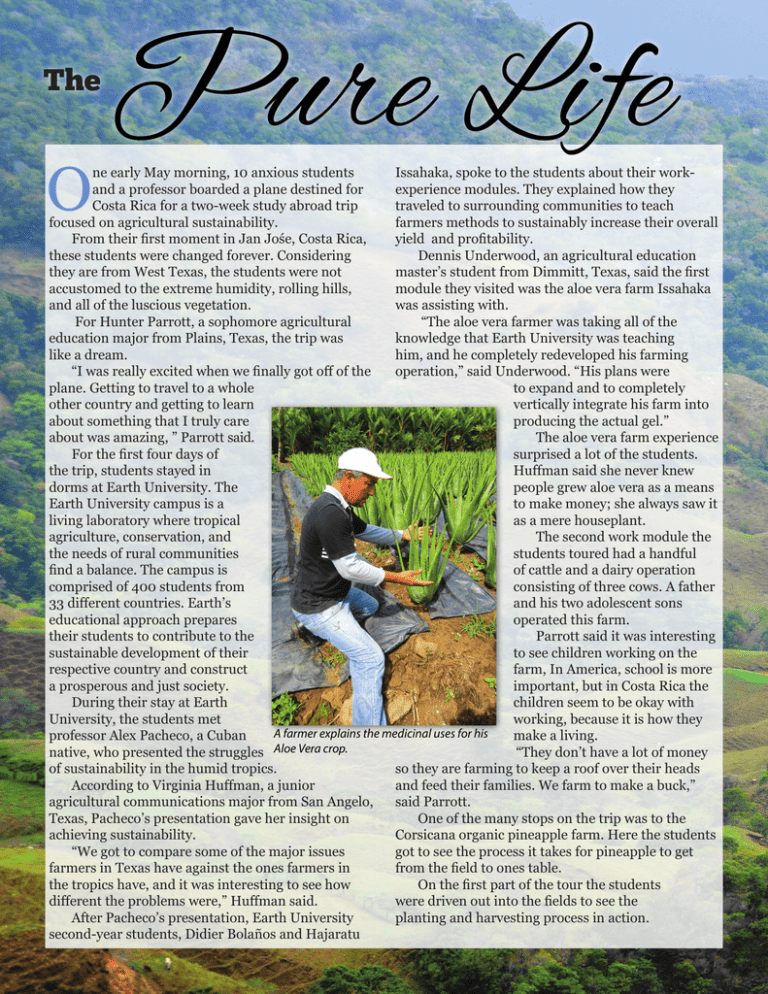
The O Pure Life ne early May morning, 10 anxious students Issahaka, spoke to the students about their workand a professor boarded a plane destined for experience modules. They explained how they Costa Rica for a two-week study abroad trip traveled to surrounding communities to teach focused on agricultural sustainability. farmers methods to sustainably increase their overall From their first moment in Jan Jośe, Costa Rica, yield and profitability. these students were changed forever. Considering Dennis Underwood, an agricultural education they are from West Texas, the students were not master’s student from Dimmitt, Texas, said the first accustomed to the extreme humidity, rolling hills, module they visited was the aloe vera farm Issahaka and all of the luscious vegetation. was assisting with. For Hunter Parrott, a sophomore agricultural “The aloe vera farmer was taking all of the education major from Plains, Texas, the trip was knowledge that Earth University was teaching like a dream. him, and he completely redeveloped his farming “I was really excited when we finally got off of the operation,” said Underwood. “His plans were plane. Getting to travel to a whole to expand and to completely other country and getting to learn vertically integrate his farm into about something that I truly care producing the actual gel.” about was amazing, ” Parrott said. The aloe vera farm experience For the first four days of surprised a lot of the students. the trip, students stayed in Huffman said she never knew dorms at Earth University. The people grew aloe vera as a means Earth University campus is a to make money; she always saw it living laboratory where tropical as a mere houseplant. agriculture, conservation, and The second work module the the needs of rural communities students toured had a handful find a balance. The campus is of cattle and a dairy operation comprised of 400 students from consisting of three cows. A father 33 different countries. Earth’s and his two adolescent sons educational approach prepares operated this farm. their students to contribute to the Parrott said it was interesting sustainable development of their to see children working on the respective country and construct farm, In America, school is more a prosperous and just society. important, but in Costa Rica the During their stay at Earth children seem to be okay with University, the students met working, because it is how they A farmer explains the medicinal uses for his professor Alex Pacheco, a Cuban make a living. native, who presented the struggles Aloe Vera crop. “They don’t have a lot of money of sustainability in the humid tropics. so they are farming to keep a roof over their heads According to Virginia Huffman, a junior and feed their families. We farm to make a buck,” agricultural communications major from San Angelo, said Parrott. Texas, Pacheco’s presentation gave her insight on One of the many stops on the trip was to the achieving sustainability. Corsicana organic pineapple farm. Here the students “We got to compare some of the major issues got to see the process it takes for pineapple to get farmers in Texas have against the ones farmers in from the field to ones table. the tropics have, and it was interesting to see how On the first part of the tour the students different the problems were,” Huffman said. were driven out into the fields to see the After Pacheco’s presentation, Earth University planting and harvesting process in action. second-year students, Didier Bolaños and Hajaratu While on the trip, students got to interact with the people of Costa Rica and experience pineapple harvesting and processing as part of understaing sustainable agriculture in the humid tropics. The leaves on top of the pineapple, called the crown have to be planted by hand. The workers dig shallow holes in the ground and place the crown inside. Each worker plants thousands of leaves each day. One thing that caught the students’ attention was the sea of black that covered sections of the field. The tour guide explained, after a harvest, workers cover the ground with weatherproof black plastic to increase the soil temperature, speed up the rate of decomposition and ensure quality soil for the next planting. The students were then driven to another section of the field where a harvest was underway. Here 12 workers slowly walked though the field examining each pineapple they passed, picking only the ripe ones. The workers in these fields were mainly immigrants from Nicaragua. The sword-like leaves on the pineapple plant are very sharp; therefore, workers are required to wear thick materials and other protective clothing to keep from getting injured while walking through the fields. Through this tour, Parrott said he gained valuable insight and an appreciation from the source of his food. “I never realized how much pineapple was produced, or how difficult it was to complete a harvest. These people had to walk through the field all day and pick each pineapple individually by hand because they ripen at different times,” Huffman said. From the field, the students were lead though the factory where the pineapples were washed, examined by workers for imperfections, sorted into boxes according to size, then stored in a cooler before being shipped to the United States. Towards the end of students’ trip, they began to have a different view on the world and what sustainability really meant. Huffman said she better understands how large of an impact agriculture has on the economy; providing much of the employment for the people in tropical climates. “I see how important agriculture is to these people and how unimportant Americans think it to be. It really changed my perspective on agriculture – getting to see where my food comes from,” said Huffman. Once more, 10 students and a professor boarded a plane; this time destined for the United States. As the plane began its take off, the students looked out at the Costa Rican landscape and reminisced on their trip and newfound knowledge. “Costa Ricans have the saying ‘pura vída’, which means pure life. I didn’t really understand it fully until the end of the trip, Parrott said. I think if more people adapted this, it would really make a difference.” “They don’t have a lot of money so they are farming to keep a roof over their heads and feed their families. We farm to make a buck”
